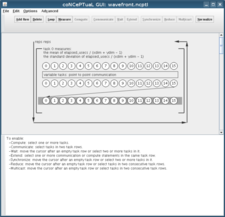Conceptual 1.0 with GUI and Eclipse Plug-in
The Conceptual domain-specific language generates programs that measure the performance and test the correctness of networks and their protocol layers. The newest version 1.0 of the product provides a graphical user interface (GUI) to facilitate generating these programs.
The coNCePTuaL developers designate their language (where the capital letters stand for Network Correctness and Performance Testing Language) as "executable pseudocode" that contains useful primitives for network programming. The resulting programs are often shorter and easier to write than in C, for example. The compiler creates UNIX executables and can thus use various backends, such as C with Message Passing Interface (MPI) or Unix-domain datagram sockets. The Conceptual programs return considerable system info and can generate diagrams.
Version 1.0 provides a JVM-based GUI for graphical program creation. The project webpage provides a trial GUI as an applet or Java Web Start application. A Conceptual plug-in for the Eclipse developer environment for writing and executing network tests is also available.
The software was developed by Los Alamos National Security, a contractor to the U.S. Department of Energy, and is available under a modified BSD-style license. The project's SourceForge page includes downloads of Conceptual, its Java GUI and Eclipse plug-in as sources and binaries.
Subscribe to our Linux Newsletters
Find Linux and Open Source Jobs
Subscribe to our ADMIN Newsletters
Support Our Work
Linux Magazine content is made possible with support from readers like you. Please consider contributing when you’ve found an article to be beneficial.

News
-
New Linux Botnet Discovered
The SSHStalker botnet uses IRC C2 to control systems via legacy Linux kernel exploits.
-
The Next Linux Kernel Turns 7.0
Linus Torvalds has announced that after Linux kernel 6.19, we'll finally reach the 7.0 iteration stage.
-
Linux From Scratch Drops SysVinit Support
LFS will no longer support SysVinit.
-
LibreOffice 26.2 Now Available
With new features, improvements, and bug fixes, LibreOffice 26.2 delivers a modern, polished office suite without compromise.
-
Linux Kernel Project Releases Project Continuity Document
What happens to Linux when there's no Linus? It's a question many of us have asked over the years, and it seems it's also on the minds of the Linux kernel project.
-
Mecha Systems Introduces Linux Handheld
Mecha Systems has revealed its Mecha Comet, a new handheld computer powered by – you guessed it – Linux.
-
MX Linux 25.1 Features Dual Init System ISO
The latest release of MX Linux caters to lovers of two different init systems and even offers instructions on how to transition.
-
Photoshop on Linux?
A developer has patched Wine so that it'll run specific versions of Photoshop that depend on Adobe Creative Cloud.
-
Linux Mint 22.3 Now Available with New Tools
Linux Mint 22.3 has been released with a pair of new tools for system admins and some pretty cool new features.
-
New Linux Malware Targets Cloud-Based Linux Installations
VoidLink, a new Linux malware, should be of real concern because of its stealth and customization.

